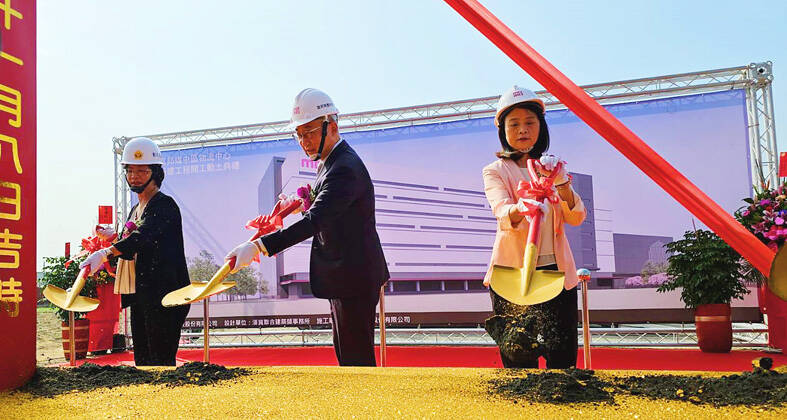Momo.com Inc (富邦媒體) yesterday broke ground for an automated logistics center in Changhua County’s Homei Township (和美) to assist the e-commerce operator in meeting its storage needs for fast delivery.
Construction of the logistics center is expected to be completed in 2027, which would help shorten the lead time for packages delivered to consumers in central Taiwan, the company said in a statement.
Upon completion, the Changhua center would be the company’s largest and most advanced logistics center in the nation, compared with its northern center in Taoyuan’s Dayuan District (大園) and southern center in Tainan’s Sinshih District (新市).

Photo: Liu Hsiao-hsin, Taipei Times
The construction site covers 9,800 ping (32,397m2), Momo said.
The company plans to build eight floors above ground and two below, investing a total of about NT$7.6 billion (US$235.67 million) in the logistics center, it said.
Central Taiwan accounts for 25 percent of Momo’s orders in Taiwan, the company said, adding that the new Changhua center is expected to process 250,000 packages per day and be able to store 5.4 million packages.
Apart from ensuring quality, speedy service for consumers in central Taiwan, the new investment is also expected to help reduce the number of deliveries and lower carbon emissions in the region, it said.
Momo, which operates three platforms — online shopping, TV home shopping and catalog shopping — has benefited from its greater logistics efficiency and a wider range of product diversity compared with local peers, with its third-quarter revenue hitting a record high NT$25.07 billion, the company reported on Tuesday.
Net profit was NT$749.86 million in the July-to-September quarter, lower than NT$842.55 million a quarter earlier and NT$756.36 million a year earlier, due to one-time asset impairment charges, the company said.
Earnings per share were NT$3.12 in the third quarter, it said.
Thanks to improving operational efficiency and economies of scale, net profit in the first three quarters of the year grew 2.8 percent year-on-year to NT$2.48 billion, with earnings per share rising from NT$10.04 to NT$10.32.
Revenue in the first three quarters hit a record NT$76.41 billion, as sales of cosmetics, healthcare, sports and leisure products maintained double-digit percentage growth from a year earlier, whereas consumer electronics and household items saw slower sales growth due to a high comparison base last year.

Micron Memory Taiwan Co (台灣美光), a subsidiary of US memorychip maker Micron Technology Inc, has been granted a NT$4.7 billion (US$149.5 million) subsidy under the Ministry of Economic Affairs A+ Corporate Innovation and R&D Enhancement program, the ministry said yesterday. The US memorychip maker’s program aims to back the development of high-performance and high-bandwidth memory chips with a total budget of NT$11.75 billion, the ministry said. Aside from the government funding, Micron is to inject the remaining investment of NT$7.06 billion as the company applied to participate the government’s Global Innovation Partnership Program to deepen technology cooperation, a ministry official told the

Taiwan Semiconductor Manufacturing Co (TSMC, 台積電), the world’s leading advanced chipmaker, officially began volume production of its 2-nanometer chips in the fourth quarter of this year, according to a recent update on the company’s Web site. The low-key announcement confirms that TSMC, the go-to chipmaker for artificial intelligence (AI) hardware providers Nvidia Corp and iPhone maker Apple Inc, met its original roadmap for the next-generation technology. Production is currently centered at Fab 22 in Kaohsiung, utilizing the company’s first-generation nanosheet transistor technology. The new architecture achieves “full-node strides in performance and power consumption,” TSMC said. The company described the 2nm process as

Shares in Taiwan closed at a new high yesterday, the first trading day of the new year, as contract chipmaker Taiwan Semiconductor Manufacturing Co (TSMC, 台積電) continued to break records amid an artificial intelligence (AI) boom, dealers said. The TAIEX closed up 386.21 points, or 1.33 percent, at 29,349.81, with turnover totaling NT$648.844 billion (US$20.65 billion). “Judging from a stronger Taiwan dollar against the US dollar, I think foreign institutional investors returned from the holidays and brought funds into the local market,” Concord Securities Co (康和證券) analyst Kerry Huang (黃志祺) said. “Foreign investors just rebuilt their positions with TSMC as their top target,

POTENTIAL demand: Tesla’s chance of reclaiming its leadership in EVs seems uncertain, but breakthrough in full self-driving could help boost sales, an analyst said Chinese auto giant BYD Co (比亞迪) is poised to surpass Tesla Inc as the world’s biggest electric vehicle (EV) company in annual sales. The two groups are expected to soon publish their final figures for this year, and based on sales data so far this year, there is almost no chance the US company led by CEO Elon Musk would retain its leadership position. As of the end of last month, BYD, which also produces hybrid vehicles, had sold 2.07 million EVs. Tesla, for its part, had sold 1.22 million by the end of September. Tesla’s September figures included a one-time boost in